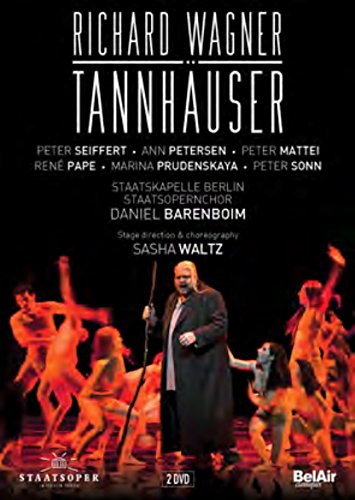WAGNER Tannhäuser
View record and artist detailsRecord and Artist Details
Composer or Director: Richard Wagner
Genre:
Opera
Label: Bel Air Classiques
Magazine Review Date: 01/2016
Media Format: Digital Versatile Disc
Media Runtime: 192
Mastering:
DDD
Catalogue Number: BAC122

Tracks:
| Composition | Artist Credit |
|---|---|
| Tannhäuser |
Richard Wagner, Composer
Berlin Staatskapelle Berlin State Opera Chorus Daniel Barenboim, Conductor Marina Prudenskaya, Venus, Mezzo soprano Peter Mattei, Eschenbach, Baritone Peter Seiffert, Tannhäuser, Tenor René Pape, Hermann, Bass Richard Wagner, Composer |
Author: Mike Ashman
Only once, in the huge, repetitive and difficult ensemble that rounds off Act 2, does the presence of dancers, and movement representing stress, guilt then repentance, feel like a faute de mieux substitute for more dramaturgical intervention. Elsewhere the Venusberg scene (Paris version, although what follows is all Dresden), with the corps de ballet present and moving the whole time in a suspended eyeball moon of a set, is delightfully slinky and sexy (Prudenskaya’s Venus ditto). The Entry of the Guests in Act 2 is a watchable mix of dance and ballet-walking, while the staged Prelude to Act 3 is a stylised pilgrimage to Rome. Most striking of all (apologies for the spoiler) is the finale’s shoulder-high carry-on of Elisabeth’s body just as the Venusberg dancers are dragging away their own rejected goddess – an idea Wagner himself tried in Dresden but was talked out of.
Musically, here is work from the conductor and orchestra on the level of their 2013 London Proms Ring, Barenboim continuing to hold Wagner especially in focus, a step forwards in style and balance from his uneven 2001 studio recording (Warner Classics, 5/02, with the same Tannhäuser, Landgraf, chorus and orchestra). Following a Bacchanale not far short in propulsion of Toscanini’s fire, Barenboim finds tempi and balance in his accompaniments that never swamp this essentially 1840s scoring with excessive Romantic modern-instrument sonorities (compare Solti or Karajan). A well-chosen cast make much of the sympathetic acoustic of the Staatsoper’s temporary Schiller Theater home, with the ladies well contrasted (an Isolde-like Elisabeth, a Venus with good low notes), Peter Mattei’s finely enunciated Wolfram and Peter Seiffert encompassing the title-role’s difficulties with a constant eye on their dramatic import.
By virtue of its grand-opera presentation in movement and its musical achievements, this Berlin Tannhäuser deserves a clear place among current small-screen versions, an intriguing contrast to the more interpreted productions of David Alden (Munich/Zubin Mehta) and Götz Friedrich (Bayreuth/Colin Davis).
Explore the world’s largest classical music catalogue on Apple Music Classical.
Included with an Apple Music subscription. Download now.

Gramophone Digital Club
- Digital Edition
- Digital Archive
- Reviews Database
- Events & Offers
From £9.20 / month
Subscribe
Gramophone Club
- Print Edition
- Digital Edition
- Digital Archive
- Reviews Database
- Events & Offers
From £11.45 / month
Subscribe
If you are a library, university or other organisation that would be interested in an institutional subscription to Gramophone please click here for further information.






